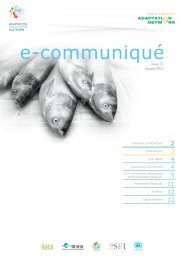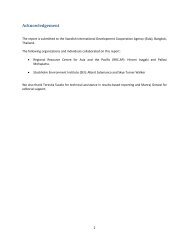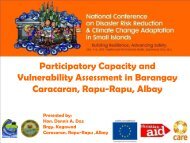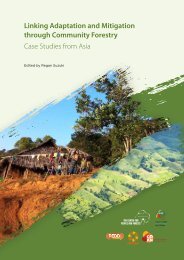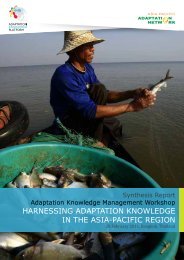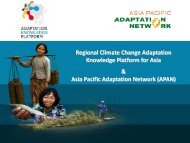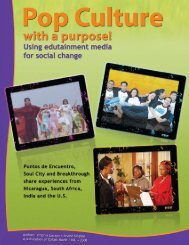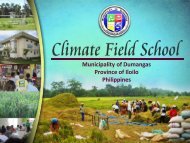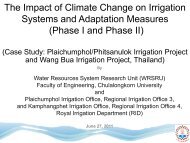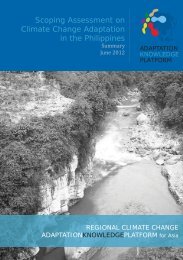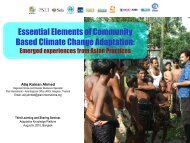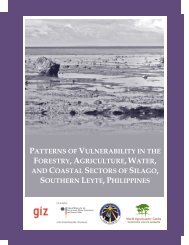Desktop Study on - Regional Climate Change Adaptation ...
Desktop Study on - Regional Climate Change Adaptation ...
Desktop Study on - Regional Climate Change Adaptation ...
You also want an ePaper? Increase the reach of your titles
YUMPU automatically turns print PDFs into web optimized ePapers that Google loves.
<str<strong>on</strong>g>Desktop</str<strong>on</strong>g> <str<strong>on</strong>g>Study</str<strong>on</strong>g><br />
support of the government to establish more local<br />
networks in other 29 provinces (ADRC, 2008).<br />
The United Nati<strong>on</strong>s Envir<strong>on</strong>mental Programme has<br />
a regi<strong>on</strong>al project, in which Thailand is included,<br />
titled “Capacity Building to Integrate Disaster Risk<br />
Reducti<strong>on</strong> into Coastal Z<strong>on</strong>e Management”. The aim<br />
of the project is building DRR capacities of coastal<br />
z<strong>on</strong>e managers for designing and implementati<strong>on</strong><br />
of projects that enhance the protecti<strong>on</strong> of lives<br />
while improving envir<strong>on</strong>mental quality. The project<br />
encompasses nati<strong>on</strong>al (India, Ind<strong>on</strong>esia, Sri Lanka)<br />
and regi<strong>on</strong>al (Maldives, Thailand, Seychelles)<br />
activities. Thailand stakeholders will be involved in<br />
the development of training manuals (comments)<br />
and participati<strong>on</strong> at regi<strong>on</strong>al workshop. The<br />
partners involved are EC Aidco, ISDR (Funding)<br />
Mangroves for the Future (MFF) Secretariat,<br />
Nati<strong>on</strong>al Coordinating Bodies and Nati<strong>on</strong>al Disaster<br />
Management Organizati<strong>on</strong>s (NDMO).<br />
SUMMARY OF IDENTIFIED<br />
KEY GAPS, CONSTRAINTS<br />
AND CHALLENGES<br />
Although Thailand has 90 climate stati<strong>on</strong>s that meet<br />
WMO standards, the country needs to strengthen<br />
a network of climate stati<strong>on</strong>s to ensure weather<br />
forecasting capabilities that can be used for assessing<br />
climate change scenarios (Bo<strong>on</strong>prakrob and Hattirat,<br />
2006); limited work has been d<strong>on</strong>e to date <strong>on</strong> climate<br />
change predicti<strong>on</strong>s at a nati<strong>on</strong>al level.<br />
Policies and measures c<strong>on</strong>cerning adaptati<strong>on</strong><br />
cannot be developed due to the lack of research and<br />
development. The adaptati<strong>on</strong> opti<strong>on</strong>s have been<br />
identify in general terms such as the development of<br />
genetic properties related to climate change, changes<br />
in agricultural practices, and aggressive water<br />
resources c<strong>on</strong>servati<strong>on</strong>. The main force in regard to<br />
vulnerability and adaptati<strong>on</strong> is to improve research<br />
and development capacities in the menti<strong>on</strong>ed areas<br />
(OEPP, 2000).<br />
The MRC report gathers a series of gaps and lack<br />
in policies, measures and acti<strong>on</strong>s that are being<br />
d<strong>on</strong>e in regard to vulnerability and adaptati<strong>on</strong> to<br />
climate change. There is still a lack in instituti<strong>on</strong>al<br />
strength, capability and availability of reliable data<br />
for generating climate scenarios. Although the<br />
emergence of threats because of changes in climate<br />
is encouraging the government, research institutes<br />
and universities to invest in climate change<br />
studies to provide technical knowledge in this<br />
area and to develop policies and ec<strong>on</strong>omics, there<br />
are limitati<strong>on</strong>s in terms of the technical capacity<br />
of experts and sourcing of appropriate funding.<br />
There has been progress from private research and<br />
academic instituti<strong>on</strong>s with expertise that carry out<br />
climate change studies and predict scenarios and<br />
also internati<strong>on</strong>al organizati<strong>on</strong>s are supporting<br />
governments and private instituti<strong>on</strong>s to carry<br />
out advanced climate change research and assess<br />
vulnerability and adaptati<strong>on</strong> opti<strong>on</strong>s.<br />
Furthermore, there is still a lack of baseline<br />
informati<strong>on</strong> to understand the interplay between<br />
natural and human systems and a gap in informati<strong>on</strong><br />
<strong>on</strong> changes in climate and human systems in different<br />
ecosystems and agro‐climatic systems. The human<br />
dimensi<strong>on</strong>, especially livelihood aspects and intersectoral<br />
relati<strong>on</strong>ships have not been incorporated<br />
successfully <strong>on</strong> the nati<strong>on</strong>al scale assessment.<br />
Without this for designing and planning adaptati<strong>on</strong><br />
policies, strategies and programs, decisi<strong>on</strong>s <strong>on</strong><br />
adaptati<strong>on</strong> will stay uncertain and will not c<strong>on</strong>duct<br />
to effective results.<br />
Not <strong>on</strong>ly is important to understand the effects of<br />
climate change and associated enhanced climate<br />
variability at the local and nati<strong>on</strong>al levels, also the<br />
capacity to select and apply appropriate methods<br />
and tools to prepare for adaptati<strong>on</strong> in essential.<br />
In this sense, in Thailand there are several studies<br />
that apply GCMs to built future climate scenarios<br />
that, also, combined with specific-sector models<br />
provide valuable informati<strong>on</strong> about impact of<br />
climate change in the sectors reviewed in this<br />
report (water, agriculture and food security, and<br />
socio-ec<strong>on</strong>omic sectors). The TEI for its country<br />
study <strong>on</strong> climate change uses three models, UK89,<br />
UKMO (United Kingdom Meteorological Office) and<br />
GISS (Goddard Institute for Space Studies). The<br />
Initial Nati<strong>on</strong>al Communicati<strong>on</strong> uses the scenarios<br />
created by the ECHAM4 GCM, elaborated by the Max<br />
Planck Institute, to analyze the impacts <strong>on</strong> water<br />
resources. The study <strong>on</strong> extreme hydrological events<br />
and changes in water resources elaborated by SEA<br />
START uses the regi<strong>on</strong>al climate scenario CCAM<br />
(C<strong>on</strong>formal Cubic Atmospheric Model) developed<br />
by CSIRO in Australia; to study the impact of the<br />
climate changes <strong>on</strong> hydrological regime, the Variable<br />
Infiltrati<strong>on</strong> Capacity Hydrological Model is used and<br />
to study impacts <strong>on</strong> agriculture the DSSAT versi<strong>on</strong><br />
4.0. To study the impacts <strong>on</strong> the agricultural sector,<br />
the MRC and the Initial Nati<strong>on</strong>al Communicati<strong>on</strong><br />
use four models, which are CSIRO global coupled<br />
ocean-atmosphere-sea-ice model, HadCM2 model,<br />
102



